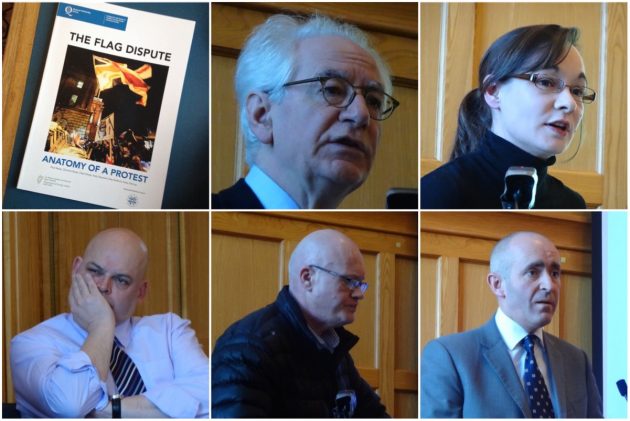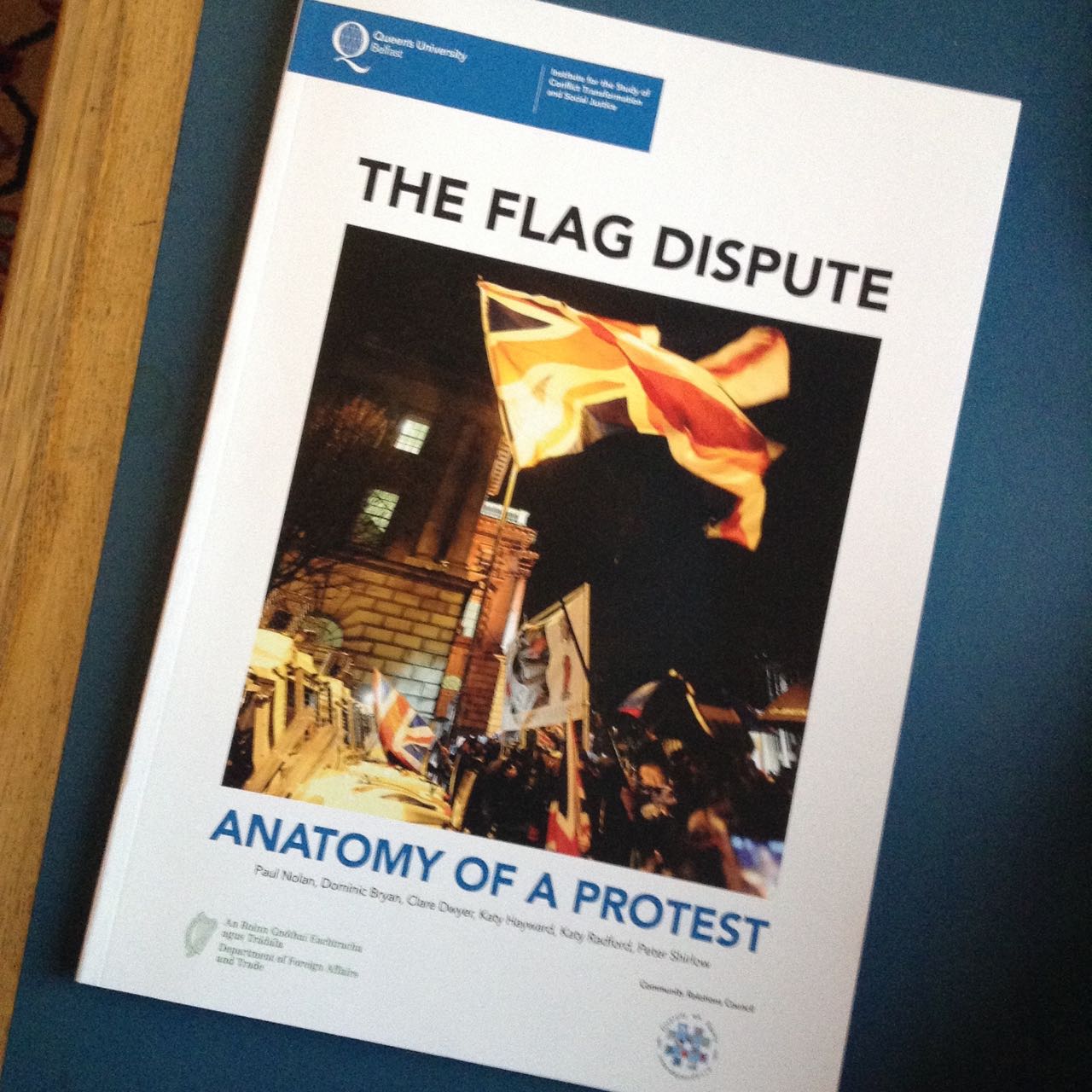The researchers from QUB’s Institute for the Study of Conflict Transformation and Social Justice behind The Flag Dispute: Anatomy of a Protest report [PDF] held a seminar in Queen’s University this morning. [Gladys Ganiel blogged in detail about the report when it was published in December.]
Two of the six researchers behind the report introduced the main findings.
 Paul Nolan quickly revisited the background to the protest (the “archaeology”). The PSNI gave researchers open access to operational logs from the flag protests. Paul pointed to the scale of the protests, at their height smaller than protests during the Troubles, but very large for peace-time. A special Police Ombudsman team poured through YouTube clips from flag protests but didn’t find examples of police brutality that were alleged elsewhere.
Paul Nolan quickly revisited the background to the protest (the “archaeology”). The PSNI gave researchers open access to operational logs from the flag protests. Paul pointed to the scale of the protests, at their height smaller than protests during the Troubles, but very large for peace-time. A special Police Ombudsman team poured through YouTube clips from flag protests but didn’t find examples of police brutality that were alleged elsewhere.
Katy Hayward pointed to the changing dynamic on the Belfast City Council. She highlighted the action of flag provocateurs who travelled around “seats of protest”, the role of women who were to the forefront in many protests, and the absence of paramilitaries leading protests.
Asked why people were protesting, many different answers were given: cultural alienation, “stamping out Alliance”, as well as “drawing a line in the sand” with an implicit threat if the line was crossed). There wasn’t one single collective reason. This also translated into protesters not being easily manipulated or blindly following “orders” … which caused problems for the police.
The role of social media was examined. There was evidence of its use to rally support amongst pre-existing (real-life) networks, but the report concluded that social media diluted the protests with “too many new ideas” and wasn’t used around serious disorder.
A crucial conclusion of the report questions the value of single identity work, calling for “dialogue not twin monologues”.
Peter Osborne responded to the report and called for strategic community leadership rather than the tactical approaches that had been taken during the protests. He also referred to a need to “move away sectional language” and approaches and to reprioritise relationship building. The police needed to be respected, but the police also needed to earn trust. Finally, he concluded that “nobody must be left behind in detached communities”.
Sam “Chalky” White from the UPRG spoke of his involvement with Charter NI, working across communities in East Belfast with vulnerable working class young people. He discussed that vulnerable young people were drawn into protests and the attempts made to stop them. Sam referred to daily face-to-face conversations and meetings across interfaces and discounted perceptions that community relations bad broken down.
Superintendent Ken Pennington was the Chief Inspector in charge of Operations Belfast during the flag dispute and offered his personal perspective. He reminded the seminar audience that the PSNI is required to facilitate protest as well as a positive obligation to protect life. He offered a defence to the accusation or perception of differential policing by outlining different situations (blocking a hospital entrance different to a major thoroughfare/motorway or protesting near an interface).
In the subsequent Q&A, audience members questioned the lack of flag protesters on the panel. Dominic Bryan responded that while not all protesters could be interviewed, the report should be judged against whether the range of flag protestor opinion was represented in the report. [Around 25 flag protesters were interviewed by Katy Radford.] A rather mellow Jamie Bryson welcomed the report though admitted that he didn’t agree with all its findings.
Overall it was a subdued seminar, with the fully-booked-out-in-advance attendance badly disrupted by the snow and perhaps the closure of Botanic Avenue and Botanic Station.
The report’s inclusion of data on protests, arrests, complaints, convictions and sentences as well as the rich quotes from those interviewed, give it longevity and authority even if some of the narrative, conclusions and recommendations will remain disputed (particularly the role of the leaflet).
The unasked question this morning was “could it happen again”?
With the new councils coming to power on 1 April in the middle of an election campaign, and the opportunity to revisit flag protocols and cultural displays in council facilities, tensions could be high in the run up to this summer. Strategic leadership may be needed, yet few would predict that it would be found in abundance.
With key issues affecting loyalist (and other) working class communities not addressed – including but not limited to educational underachievement – loyalist voices not being heard any louder than before the flag dispute began.
Alan Meban. Tweets as @alaninbelfast. Blogs about cinema and theatre over at Alan in Belfast. A freelancer who writes about, reports from, live-tweets and live-streams civic, academic and political events and conferences. He delivers social media training/coaching; produces podcasts and radio programmes; is a FactCheckNI director; a member of Ofcom’s Advisory Committee for Northern Ireland; and a member of the Corrymeela Community.
Discover more from Slugger O'Toole
Subscribe to get the latest posts to your email.
